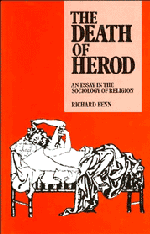Book contents
- Frontmatter
- Contents
- Acknowledgments
- Introduction
- 1 Two methodological viewpoints: the priestly and the prophetic
- 2 Description, interpretation, and explanation: modes of analysis
- 3 Levels of observation and of analysis: making the right choices
- 4 “What is going on here?” The role of the observer and the beginnings of theory
- 5 The search for useful concepts: evil and charisma
- 6 The making of a theory
- Epilogue
- References
- Author index
- Subject index
- Index of biblical citations
3 - Levels of observation and of analysis: making the right choices
Published online by Cambridge University Press: 07 January 2010
- Frontmatter
- Contents
- Acknowledgments
- Introduction
- 1 Two methodological viewpoints: the priestly and the prophetic
- 2 Description, interpretation, and explanation: modes of analysis
- 3 Levels of observation and of analysis: making the right choices
- 4 “What is going on here?” The role of the observer and the beginnings of theory
- 5 The search for useful concepts: evil and charisma
- 6 The making of a theory
- Epilogue
- References
- Author index
- Subject index
- Index of biblical citations
Summary
REVIEWING THE ARGUMENT: THE DIFFICULT TASK OF INTERPRETATION
We have been engaged in several preliminary reflections on the tensions in Palestinian society at the time of the death of Herod. On the one hand, the trial of the sons of Herod before Caesar suggests that there was a rising popular as well as political demand to resolve the controversy between generations not only in that household, I have argued, but in the society itself. What makes this demand “serious,” furthermore, is what commends it to the attention of a sociologist of religion. It is “la vie sérieuse,” as Durkheim put it, that constitutes the province of the sociologist of religion: not merely the groups and movements, institutions or major figures that are conventionally defined as “religious.” Now, in the conflict between generations, far more is at stake than the survival of the Herodian regime or the honors for the dead demanded by the followers of slain Rabbis. In according these honors the nation achieves its own line of spiritual succession and guarantees, as it were, its own continuity and vitality. Those honors conflicted, quite clearly, with the honors demanded by Archelaus at the moment of his succession. In the stalemate between the two lines of succession, the life of the nation itself is at stake. The two social systems, one Roman and the other national, have thus reached a stand-off that threatens the survival of both of them.
- Type
- Chapter
- Information
- The Death of HerodAn Essay in the Sociology of Religion, pp. 81 - 109Publisher: Cambridge University PressPrint publication year: 1992



